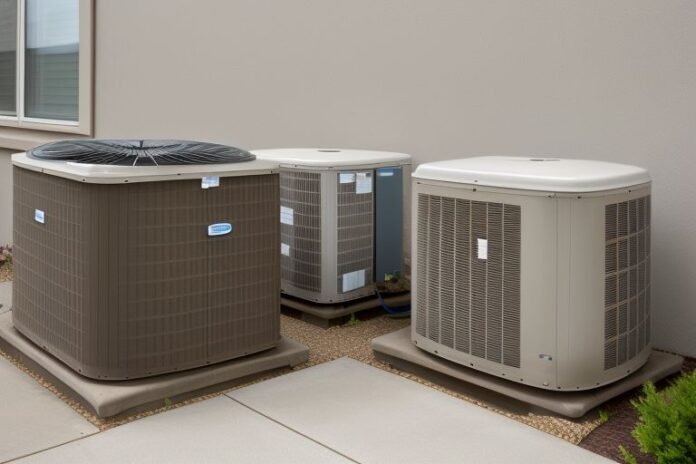In the world of business, having a good temperature and air quality inside buildings is essential, not just something nice to have. This includes many places like workspaces, stores, medical centers, and factories. To make sure that workers, clients, and the whole process run smoothly; these businesses depend on effective Heating Ventilation, and Air Conditioning systems. In this article, we explore the complex world of commercial HVAC systems. We look at the different requirements that businesses have and discuss the new technologies and methods used to satisfy those needs.
Understanding Commercial HVAC Systems
Commercial heating and cooling systems are made with the special needs of big buildings and industrial places in mind. They are more complicated and stronger than home systems, able to work for bigger areas at higher capacities, giving very accurate control over temperature. Commercial HVAC systems usually have central heating and cooling machines, pipes for airflow, control devices, and parts for fresh air that are made to fit the unique needs of the building and people inside.
Customization and Tailored Solutions
Commercial HVAC systems stand out because they can be adapted to fit the special needs of every company. Commercial buildings are different from homes in many ways, like how big they are, their design, how many people use them and for what purposes; this means that heating and cooling setups must be carefully made to suit these particular conditions. Commercial HVAC contractors collaborate with company managers, building designers, and technical experts to create, set up, and look after systems that make energy use better, improve the quality of air inside buildings, and increase comfort. They also try to keep running expenses low and reduce effects on nature.
Moreover, integration with BAS facilitates data collection and analysis, providing valuable insights into building performance and occupant comfort. By leveraging data analytics and predictive maintenance algorithms, businesses can proactively identify potential issues, prevent equipment failures, and optimize system performance over time.
Types of Commercial HVAC Systems
Commercial HVAC systems include many designs and technologies made to meet the different requirements of companies in several sectors.
Rooftop Units, often called RTUs, are all-in-one HVAC systems put on top of buildings. They handle heating, cooling, and air flow together. These units are chosen for business structures because they don’t take much space, they’re simple to set up and you can adjust their size as needed. Split systems are made up of different units inside and outside, which are linked by pipes for the cooling substance. They work well for small business areas or places with not much space on the roof for rooftop units. Split systems provide the ability to adjust zones and control temperature in various parts of a building, making it possible to set comfort levels according to individual preferences.
Variable Refrigerant Flow Systems, or VRF systems for short, make use of sophisticated heat pump technology that allows them to give both heating and cooling at the same time to distinct areas inside a building. These systems are known for their ability to control temperature with accuracy, save energy, and work quietly. Because of these qualities, they are very suitable for commercial uses where the number of people present and how spaces are used can change often.
Cold water setups circulate cool water through piping to give cooling for air handlers and fan coils in a building. This method is often seen in big business structures like office buildings, medical facilities, and hospitality establishments where there’s a need for central cooling.
Integration with Building Automation Systems
A very important part of business heating, ventilating, and air conditioning systems is how they work together with building automation systems. These systems let you control and watch over different parts of the building like the temperature controls, lights, security, and other things from one place. By combining HVAC systems with building automation systems, companies can improve how they use energy, make sure people are more comfortable, and manage their buildings better. People in charge of buildings can keep an eye on and change the settings of the HVAC from a distance, plan when machines should run according to when people are there, and get updates immediately if there is a problem or something isn’t working right with the equipment. The combination of these systems not only makes operations run smoother but also lets us take care of maintenance and fix problems before they get worse, which means there’s less time when things aren’t working and people in the building can stay comfortable without interruptions.
Energy Efficiency and Sustainability
Over the past few years, more attention has been paid to how energy-efficient and sustainable commercial HVAC systems should be. Companies are starting to use more of these types of HVAC that save energy and they follow eco-friendly methods too so they can use less power, spend less money on running things, and not harm the environment as much. Features that save energy like motors with adjustable speeds, filters that work very well, and modern controls make the system run better while using less energy and making fewer carbon emissions.
Maintenance and Service
Routine check-ups and service are very important for keeping commercial HVAC systems reliable, working well, and lasting long. Contractors who specialize in commercial HVAC provide detailed maintenance programs that fit the needs of different companies. These include regular checks, changing filters, adjusting the system settings, and fixing any urgent problems. When businesses put money into regular maintenance before problems occur, they can prevent expensive failures, make their systems work better and extend the time their HVAC equipment lasts.
Conclusion
Commercial HVAC systems are essential for providing heating and cooling in different kinds of businesses, like offices, shops, hospitals, and factories. These businesses depend on good and dependable HVAC to make the inside spaces comfortable so people can work well. Commercial HVAC contractors support businesses by adopting new technologies, personalizing systems, improving energy use, and being eco-friendly. This helps companies to make sure their spaces are comfortable, manage expenses better, and reduce harm to the environment. They work towards making HVAC systems ready for current needs while preparing for future demands as well.







